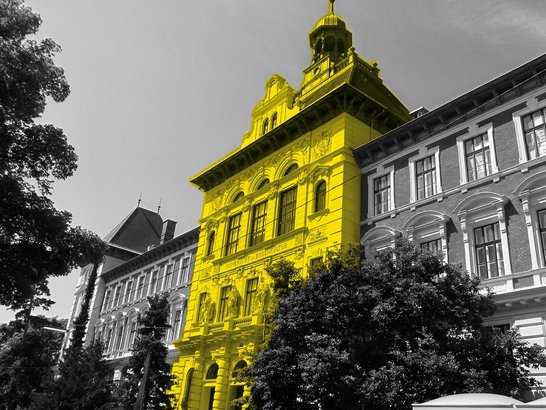BOKU University

BOKU University, situated in Vienna, was initially founded as a university of agriculture and forestry in 1872. Nowadays it covers a unique range of research topics from agriculture to biotechnology. Deriving from its mantra – to be a "University of Life and Sustainability" – BOKU aims to take on a societal and political responsibility. Research and teaching is characterised by its holistic approach to dealing with societal challenges in the fields of protecting habitat and quality of life, managing natural resources and the environment and protecting food and health. BOKU enjoys an outstanding reputation and offers an exceptional environment: It has always been a place of encounter for different fields of science, research topics, opinions, attitudes, people and nationalities; openness and diversity characterise everyday life at this university.
Faculties and programmes | Departments
Water, Atmosphere and Environment | Bionanosciences | Chemistry | Integrative Biology and Biodiversity Research | Food Sciences and Technology | Landscape, Spatial and Infrastructural Sciences | Economics and Social Sciences |Sustainable Agricultural Systems | Civil Engineering and Natural Hazards | Forest and Soil Sciences | Crop Sciences | Agrobiotechnology (IFA Tulln) | Applied Genetics and Cell Biology | Material Sciences and Process Engineering | Biotechnology
BOKU offers seven bachelor's and 35 master's programmes as well as 12 doctoral programmes.
Specials
BOKU – the University of Natural Resources and Life Sciences, Vienna supports the concept of a European and global bio-economy 2030, addressing the grand societal challenges: sustainable management of natural resources, sustainable production, improving public health, mitigating climate change, integrating and balancing social developments and global sustainable development.
The Institute for Development Research is dedicated to the transfer of know-how and technology for sustainable development in Africa, Asia and Latin America.
An integral part of BOKU is the Vienna Institute of Biotechnology (VIBT); it is home to those institutes that deal directly or indirectly with this future key technology. BOKU offers programmes on bachelor's, master's and doctoral level, providing sound academic and practice oriented education. Half of the master's programmes are offered in English, more than a third in collaboration with international partner universities. All study programmes share a strong interdisciplinary character, based on natural sciences and engineering as well as social sciences and economics. Thus, BOKU graduates are highly employable in research, non profit management and economy.